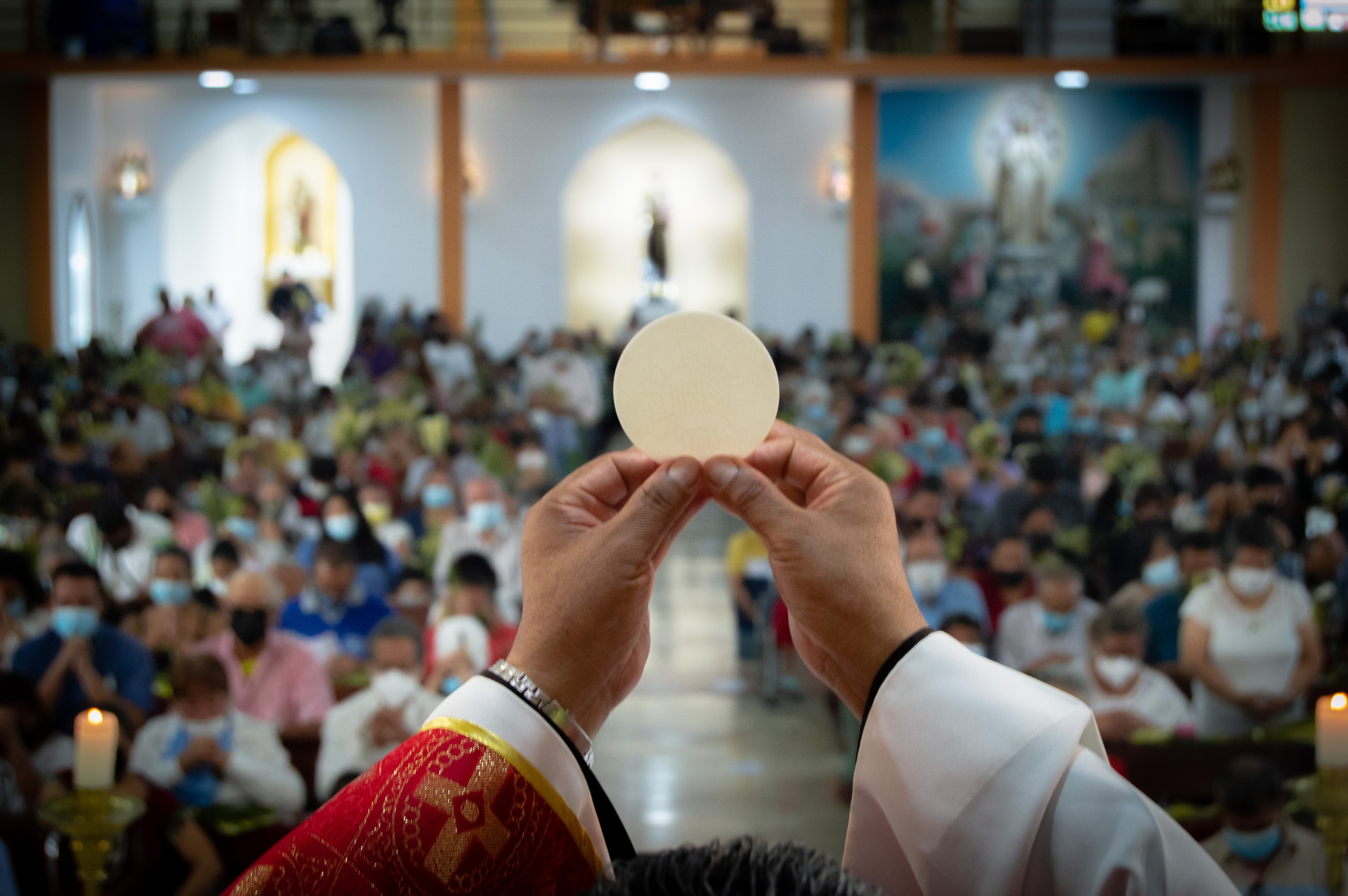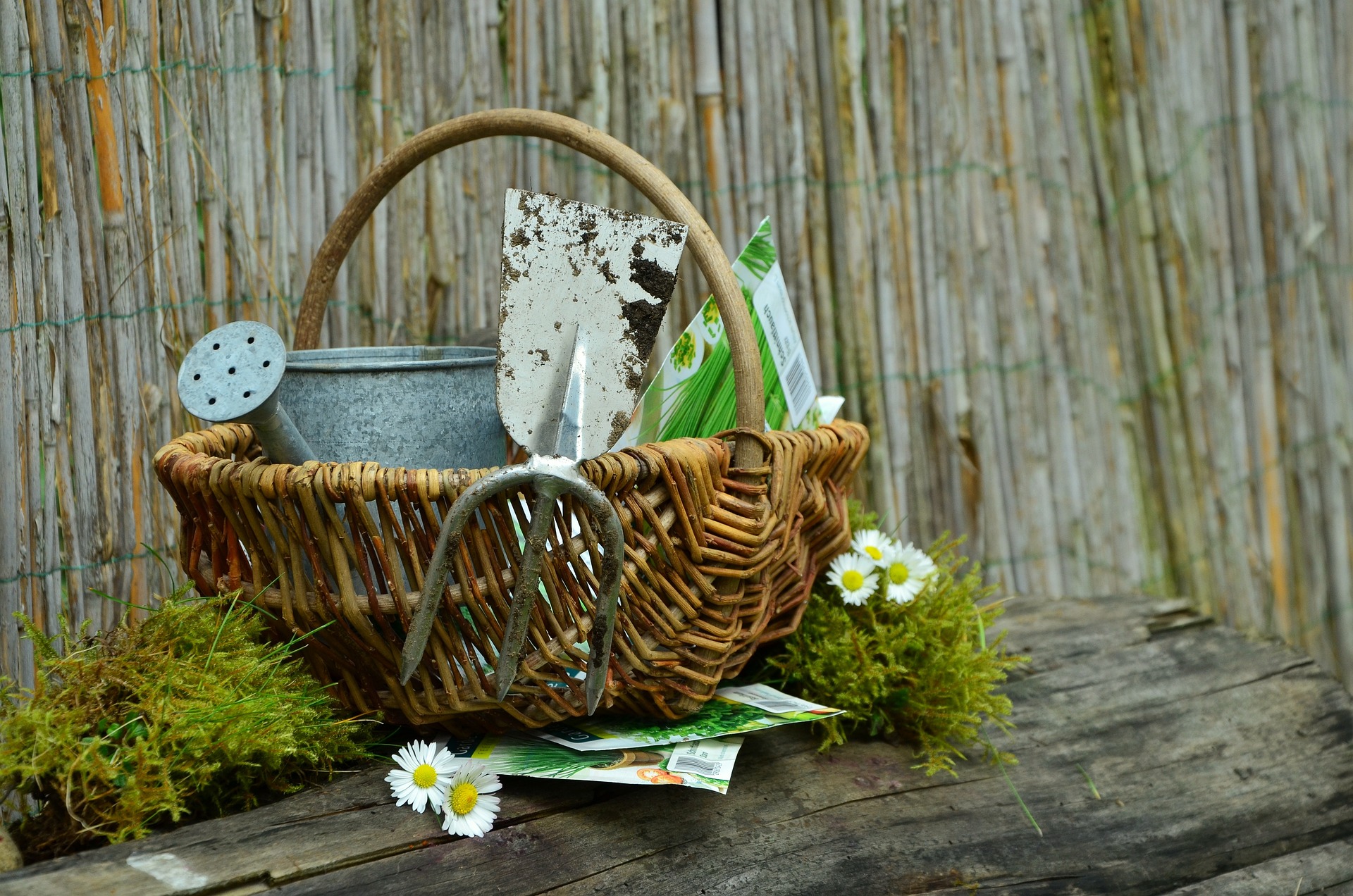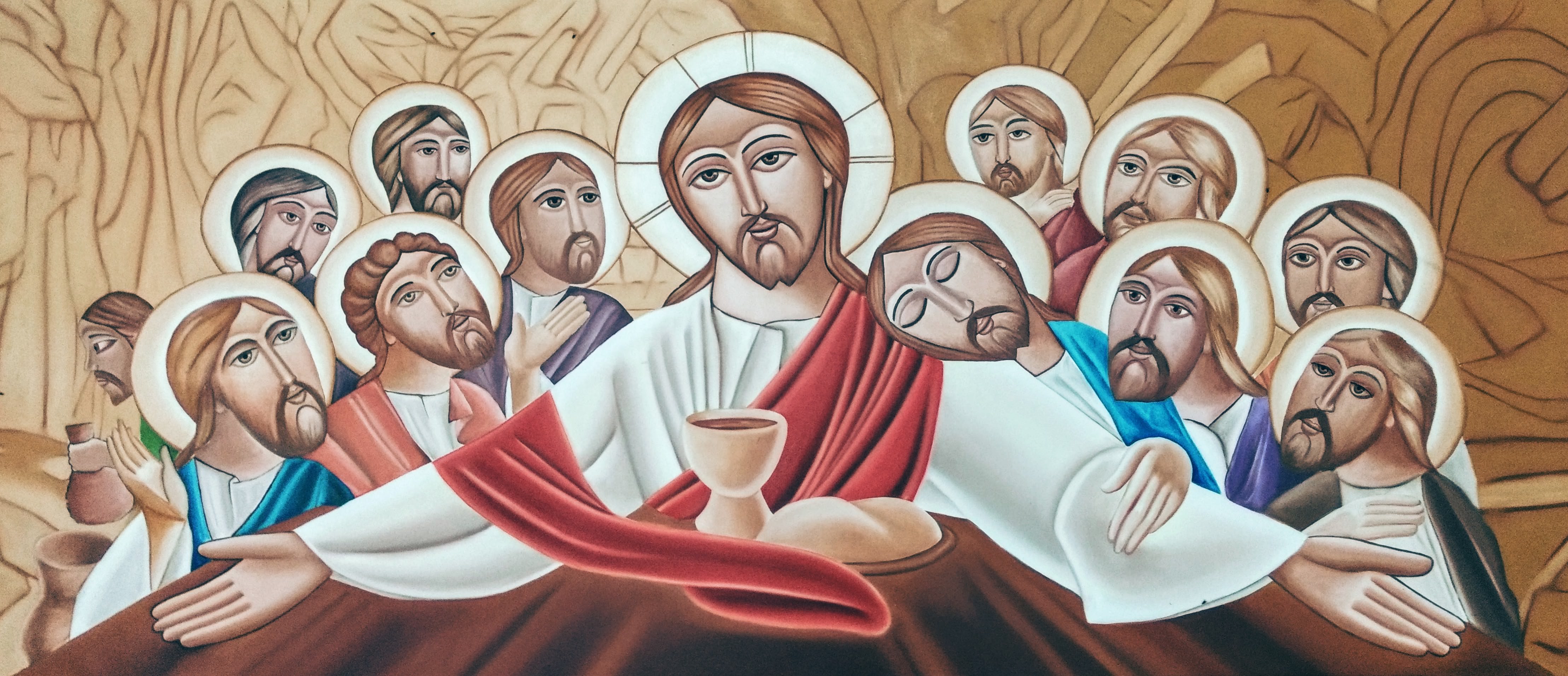Today’s First Reading from the book of Genesis reminds me of my father-in-law who died from cancer nine years ago.
During the twenty years prior to Dad’s death, he and his wife traveled the U.S. in a motorhome, serving others and sharing the Gospel message, while daily depending on the Lord to meet all their needs.
When my husband and I invited my in-laws to come live with us after Dad’s terminal diagnosis, our family was privileged to watch this prayerful man slowly detach from his earthly life and, over the course of six weeks, prepare himself to meet Jesus.
As we readied our house to receive my husband’s parents, I had the recurring image of Dad as the burning bush who, “though on fire, was not consumed.” I even drew a picture of a burning bush to hang on the wall of his room along with my children’s artwork. Almighty God spoke to Moses through the burning bush, and I believe my father-in-law, in his life and, especially near the time of his death, was used by God to speak the truth of His love to a hurting world. Dad was set on fire with God’s love. Even though the cancer in one sense destroyed him, it could not destroy his soul. He was more fully united to Christ than ever.
This theme of the burning bush continued to reassert itself throughout the weeks that followed. For example, as we gathered around my father-in-law’s bed for the anointing of the sick, my feet started feeling uncomfortably restricted in my sneakers which, due to foot problems, I wear almost constantly. I was compelled to remove my shoes. After doing so, I remembered the command found in Genesis when Moses was approaching the burning bush. He was told to remove his sandals because the ground was holy. Now, the sick room was holy ground. God was not only present in my father-in-law, but He had come in a profound way in the person of the priest and in the sacrament of the Anointing of the Sick.
Finally, on the day my father-in-law passed, our family was keeping vigil in his room. We knew he was hovering at the edge of this earthly life. Some of his last words were, “Thank you, Jesus.” As we prayed and waited, suddenly the words, “Take off your shoes, this is holy ground,” flashed into my mind. The moment I removed my shoes there was a knock at our front door. An extraordinary minister of Holy Communion had brought the Blessed Sacrament to our home. Holy ground indeed!
As we live our lives and contemplate our deaths, the analogy of the burning bush is one that we can all meditate on. Our lives, like my father-in-law’s, can be used by God to transmit his saving message to the world. The process will sometimes burn, but we will not be harmed. On the contrary, we will be purified, and we will be prepared to see God face-to-face.
La Primera Lectura de hoy del libro de Génesis me recuerda a mi suegro que murió de cáncer hace nueve años.
Durante los veinte años anteriores a su muerte, él y su esposa viajaron por los EEUU en una casa rodante, sirviendo a los demás y compartiendo el mensaje del Evangelio, mientras dependían diariamente del Señor para satisfacer todas sus necesidades.
Cuando mi esposo y yo invitamos a mis suegros a vivir con nosotros después del diagnóstico terminal de papá, nuestra familia tuvo el privilegio de ver a este hombre devoto separarse lentamente de su vida terrenal y, en el transcurso de seis semanas, prepararse para encontrarse con Jesús.
Mientras alistamos nuestra casa para recibir a los padres de mi esposo, tenía la imagen recurrente de mi suegro como la zarza ardiente que, “aunque ardía, no se consumía”. Incluso hice un dibujo de un arbusto en llamas para colgarlo en la pared de su habitación junto con las obras de arte de mis hijos. Dios Todopoderoso le habló a Moisés a través de la zarza ardiente, y creo que mi suegro, en su vida y, especialmente cerca del momento de su muerte, fue usado por Dios para hablar la verdad de Su amor a un mundo herido. Papá estaba ardiendo con el amor de Dios. Aunque el cáncer en un sentido lo destruyó, no pudo destruir su alma. Estaba más unido a Cristo que nunca.
Este tema de la zarza ardiente continuó reafirmándose a lo largo de las semanas siguientes. Por ejemplo, mientras nos reunimos alrededor de la cama de mi suegro para la unción de los enfermos, mis pies comenzaron a sentirse incómodamente restringidos en mis zapatillas que, debido a problemas en los pies, uso casi constantemente. Me sentí obligada a quitarme los zapatos. Después de hacerlo, recordé el mandato que se encuentra en Génesis cuando Moisés se acercaba a la zarza ardiente. Le dijeron que se quitara las sandalias porque la tierra era santa. Ahora, la habitación del enfermo era tierra santa. Dios no sólo estaba presente en mi suegro, sino que había venido de manera profunda en la persona del sacerdote y en el sacramento de la Unción de los Enfermos.
Finalmente, el día que falleció mi suegro, nuestra familia velaba en su cuarto. Sabíamos que estaba en el borde de esta vida terrenal. Algunas de sus últimas palabras fueron: “Gracias, Jesús”. Mientras orábamos y esperábamos, de repente me vinieron a la mente las palabras: “Quítate los zapatos, esta es tierra santa”. En el momento en que me quité los zapatos tocaron a la puerta. Un ministro extraordinario de la Sagrada Comunión había traído el Santísimo Sacramento a nuestra casa. ¡Ciertamente tierra santa!
Mientras vivimos nuestras vidas y contemplamos nuestras muertes, la analogía de la zarza ardiente es algo en lo que todos podemos meditar. Nuestras vidas, como la de mi suegro, pueden ser usadas por Dios para transmitir su mensaje salvador al mundo. El proceso a veces quema, pero no nos lastimará. Al contrario, seremos purificados y estaremos preparados para ver a Dios cara a cara.
 A lover of Jesus Christ, a wife, and a mother of five, Christine is the author of Everyday Heroism: 28 Daily Reflections on the Little Way of Motherhood. She is a graduate of Franciscan University, an instructor for the Institute for Excellence in Writing, and an experienced catechist. Thrilled to have recently become grandparents, she and her husband currently live in Upstate, NY. Visit her author webpage at christinehanus.com
A lover of Jesus Christ, a wife, and a mother of five, Christine is the author of Everyday Heroism: 28 Daily Reflections on the Little Way of Motherhood. She is a graduate of Franciscan University, an instructor for the Institute for Excellence in Writing, and an experienced catechist. Thrilled to have recently become grandparents, she and her husband currently live in Upstate, NY. Visit her author webpage at christinehanus.com
Feature Image Credit: Andy Watkins, unsplash.com/photos/L6O2GaNSsWU


 Mike Karpus is a regular guy. He grew up in Michigan’s Upper Peninsula, graduated from Michigan State University and works as an editor. He is married to a Catholic school principal, raised two daughters who became Catholic school teachers at points in their careers, and now relishes his two grandchildren, including the older one who is fascinated with learning about his faith. He also has served on a Catholic school board, a pastoral council and a parish stewardship committee. He currently is a lector at Mass, a Knight of Columbus, Adult Faith Formation Committee member and a board member of the local Habitat for Humanity organization. But mostly he’s a regular guy.
Mike Karpus is a regular guy. He grew up in Michigan’s Upper Peninsula, graduated from Michigan State University and works as an editor. He is married to a Catholic school principal, raised two daughters who became Catholic school teachers at points in their careers, and now relishes his two grandchildren, including the older one who is fascinated with learning about his faith. He also has served on a Catholic school board, a pastoral council and a parish stewardship committee. He currently is a lector at Mass, a Knight of Columbus, Adult Faith Formation Committee member and a board member of the local Habitat for Humanity organization. But mostly he’s a regular guy.
 Susan Ciancio has a BA in psychology and a BA in sociology from the University of Notre Dame, with an MA in liberal studies from Indiana University. For the past 19 years, she has worked as a professional editor and writer, editing both fiction and nonfiction books, magazine articles, blogs, educational lessons, professional materials and website content. Thirteen of those years have been in the pro-life sector. Currently Susan freelances and writes weekly for HLI, edits for American Life League, and is the executive editor of Celebrate Life Magazine. She also serves as executive editor for the Culture of Life Studies Program—an educational nonprofit program for K-12 students. You can reach her at
Susan Ciancio has a BA in psychology and a BA in sociology from the University of Notre Dame, with an MA in liberal studies from Indiana University. For the past 19 years, she has worked as a professional editor and writer, editing both fiction and nonfiction books, magazine articles, blogs, educational lessons, professional materials and website content. Thirteen of those years have been in the pro-life sector. Currently Susan freelances and writes weekly for HLI, edits for American Life League, and is the executive editor of Celebrate Life Magazine. She also serves as executive editor for the Culture of Life Studies Program—an educational nonprofit program for K-12 students. You can reach her at 
 Allison Gingras (
Allison Gingras ( 


 Tami Urcia grew up in Western Michigan, a middle child in a large Catholic family. She spent early young adulthood as a missionary in Mexico, studying theology and philosophy, then worked and traveled extensively before finishing her Bachelor’s Degree in Western Kentucky. She loves tackling projects, finding fun ways to keep her little ones occupied, quiet conversation with the hubby and finding unique ways to love. She works at for Christian Healthcare Centers, is a guest blogger on
Tami Urcia grew up in Western Michigan, a middle child in a large Catholic family. She spent early young adulthood as a missionary in Mexico, studying theology and philosophy, then worked and traveled extensively before finishing her Bachelor’s Degree in Western Kentucky. She loves tackling projects, finding fun ways to keep her little ones occupied, quiet conversation with the hubby and finding unique ways to love. She works at for Christian Healthcare Centers, is a guest blogger on 
 J.M. Pallas has had a lifelong love of Scriptures. When she is not busy with her vocation as a wife and mother to her “1 Samuel 1” son, or her vocation as a public health educator, you may find her at her parish women’s bible study, affectionately known as “The Bible Chicks.”
J.M. Pallas has had a lifelong love of Scriptures. When she is not busy with her vocation as a wife and mother to her “1 Samuel 1” son, or her vocation as a public health educator, you may find her at her parish women’s bible study, affectionately known as “The Bible Chicks.”
 Kathryn Mulderink, MA, is married to Robert, Station Manager for Holy Family Radio. Together they have seven children (including Father Rob), and seven grandchildren. She is President of the local community of Secular Discalced Carmelites and has published five books and many articles. Over the last 30 years, she has worked as a teacher, headmistress, catechist, Pastoral Associate, and DRE, and as a writer and voice talent for Catholic Radio. Currently, she serves the Church by writing and speaking, and by collaborating with various parishes and to lead others to encounter Christ and engage their faith. Her website is
Kathryn Mulderink, MA, is married to Robert, Station Manager for Holy Family Radio. Together they have seven children (including Father Rob), and seven grandchildren. She is President of the local community of Secular Discalced Carmelites and has published five books and many articles. Over the last 30 years, she has worked as a teacher, headmistress, catechist, Pastoral Associate, and DRE, and as a writer and voice talent for Catholic Radio. Currently, she serves the Church by writing and speaking, and by collaborating with various parishes and to lead others to encounter Christ and engage their faith. Her website is 
 Kate Taliaferro is an Air Force wife and mother. She is blessed to be able to homeschool, bake bread and fold endless piles of laundry. When not planning a school day, writing a blog post or cooking pasta, Kate can be found curled up with a book or working with some kind of fiber craft. Kate blogs at
Kate Taliaferro is an Air Force wife and mother. She is blessed to be able to homeschool, bake bread and fold endless piles of laundry. When not planning a school day, writing a blog post or cooking pasta, Kate can be found curled up with a book or working with some kind of fiber craft. Kate blogs at 
 Sr. Mary Martha Moss, FSP has had the grace of serving the Lord for over 40 years as a Daughter of St. Paul. Joyfully engaged in the community’s media ministry, she has authored 3 children’s books, presented on various topics for adult faith formation, enjoyed running Online Book Studies, served as a Pauline Book & Media Center manager and continues singing the alto part with the Daughters of St. Paul Concert Choir.
Sr. Mary Martha Moss, FSP has had the grace of serving the Lord for over 40 years as a Daughter of St. Paul. Joyfully engaged in the community’s media ministry, she has authored 3 children’s books, presented on various topics for adult faith formation, enjoyed running Online Book Studies, served as a Pauline Book & Media Center manager and continues singing the alto part with the Daughters of St. Paul Concert Choir.